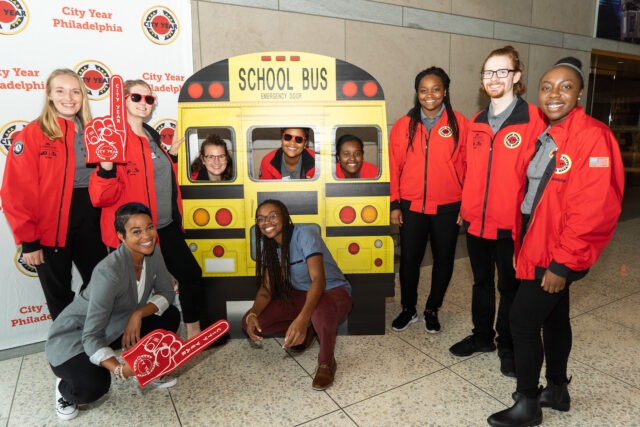City Year can prepare you for a career in school psychology

Creating support systems for students is not a one-size-fits-all solution. As an undergraduate at the University of Nebraska, Hannah Terrell thought about pursuing a career as a school psychologist and how she could build one-on-one relationships with students. Before applying to graduate school, though, she wanted to learn more about the day-to-day functioning of schools.
That’s why Hannah decided to apply to City Year Philadelphia during her senior year. She was accepted and served at Roosevelt Elementary School as an AmeriCorps member in the 2019-2020 school year—a year that started as usual but was then disrupted by the spread of COVID-19 in March 2020.
Throughout her year of service, Hannah built bonds with her students and her AmeriCorps teammates that gave her the experience and skills she needed to prepare her for her doctorate program at Fordham University and eventually her career as a school psychologist.

Hannah shares her reflections and insights in the conversation below, which has been edited for length and clarity.
What is school psychology?
School psychology is a field that combines the fields of psychology and education to ensure that students have the tools they need to develop and succeed. The National Association of School Psychologists describes school psychologists as “uniquely qualified members of school teams that support students’ ability to learn and teachers’ ability to teach.”
School psychologists not only provide students with the support they need to thrive academically but also mental health services. Some services that school psychologists provide include, but are not limited to, conducting psychological and behavioral assessments, filing Individualized Education Programs (IEP), and crisis intervention.
The National Association of School Psychologists recommends schools have one psychologist for every 500 students (1:500 ratio.) Yet the national average is 1:1,211 and some states fall far below that average, with only one psychologist for every 5,000 students.
A 2022 survey by Education Week found that while most schools do have school psychologists and counselors, some do not have any. More than 5.4 million public school students (12%) attend districts with no psychologists; nearly half a million students (1%) attend districts with no school counselors.
Hannah Terrell is in her second year of her six-year program at Fordham University in New York City. A PhD program offers a mix of coursework, research projects and eventually practicums and externship placements in schools.
“Currently I’m taking classes on things like applied behavior analysis and working on a research project that relates to a program that I learned about while I was in City Year called Positive Behavior Intervention and Supports,” shared Hannah.
When Hannah enters a school, she looks forward to building positive, trusting and caring relationships with students and families.
“I hope to be able to answer questions students may have about themselves and support them in finding pathways to receive necessary resources and support,” Hannah said.
Learning the skills to be a school psychologist
AmeriCorps members are assigned to school teams where they partner with classroom teachers to support students in math, literacy and social-emotional learning. This partnership involves identifying which student may benefit from additional tutoring, redirecting student behavior and creating spaces for fun.
“I learned how to navigate talking with school stakeholders and working on a team of people,” says Hannah. “It’s definitely something I’m going to have to do in my career.”
Hannah said that she learned how to help students advocate for themselves rather than just focusing on advocating on their behalf.
“I had a couple of instances in school where I helped connect students with their teachers and guidance counselors. I gained an understanding in how to uplift students in their day-to-day lives and help them find the resources they need from the school itself.”
Teaching students how to self-advocate can occur in many ways. School psychologists in particular can help give students agency in their own assessment process through methods such as Therapeutic Collaborative Assessment.
Supporting students to advocate for themselves
One instance Hannah helped a student advocate for himself occurred when he had forgotten to do his homework.
“This student immediately had self-doubt and was nervous since the deadline had passed,” Hannah said. “He explained to me that he had a lot of things going on and how he had tried to frantically reach out to the teacher. We took a moment to take a deep breath and discussed another way we could approach the teacher.”
Hannah and her student came up with a plan and he decided to apologize to his teacher and express that he could not only complete the work but have the work done by tomorrow if she granted an extension.
“The teacher was a lot more receptive to that and explained that she wanted to hold her students to a high standard. I think this interaction ultimately helped not only the student but also the teacher because they were able to communicate where they were both coming from and work out a resolution together.”
Applying to graduate school while serving as a City Year AmeriCorps member
From writing personal statements, requesting recommendations and meeting deadlines, applying to grad school can be stressful especially for busy corps members. Terrell advises prospective applicants to prepare application material as early as possible because deadlines can sneak up and it is important to make time for any edits and requests.
“Plan ahead as much as you can especially with your days off. You might need to use your PTO (paid time off) to go to an interview. Also don’t forget about office hours.”
City Year sites offer AmeriCorps members office space they can come to after school service. Office hours are an opportunity for corps members to utilize quiet space to study, complete applications or other tasks and these hours can also count towards required service hours.
It is common practice when applying to graduate programs to research professors who can potentially be advisors for students conducting research. Hannah applied to several schools based on her interest in working with certain professors but she advises applicants to not just consider potential connections with professors when considering programs.
“The interview day is a great opportunity to see whether you may be a good fit for a school, but also whether the school may be a good fit for you,” Hannah said. “You can gain a sense about the culture of the program through an interview day or even touring campus. It’s important to find a school that is a good fit both in terms of faculty you can work with and feels like the right environment for you to be successful.”
Using your Segal Education Award
AmeriCorps members are granted a Segal Education Award worth more than $6,000 after completing their service. Segal Education Awards can be used to towards existing federal loans or tuition at a Title IV school.
Segal Education Awards are taxed so Hannah suggests using the award in increments.
“I used half of my Segal Education Award during the fall semester and the other half in the spring. At Fordham, the award is distributed at the beginning and middle of the semester. So if you decide to split a $6,000 award into two semesters then you would receive $1,500 at the beginning and middle of fall and likewise in spring.”
Be sure to connect with your university’s financial aid office to confirm the Segal Education Award distribution process since this can vary by institution.
Whatever career or graduate school path you decide to pursue after your service with City Year, we hope the skills, experiences and relationships you build with your teammates, students and partner teachers will help you in your future!
Learn more about the career resources that City Year offers to AmeriCorps members:
Related stories
Because you'll be living on a stipend, it might be a good idea to hold off on that ottoman from...
Read more about Furnishing your apartment on a budget: Tips for AmeriCorps membersCity Year’s “Why We Matter” podcast explores the vital role of education and mentorship in empowering young people. Through interviews...
Read more about Why City Year’s student success coach network mattersRead more and check the City Year blog to learn the soft skills our corps members gain through a year...
Read more about Top five skills employers want you to have todayIf you speak with an alum of an historically Black college or university (HBCU) about their experience, you’ll quickly learn...
Read more about Serving with City Year sharpens job skills, HBCU graduate says















